Every year, one in five American adults experiences a mental health condition. And the majority of these people are of working age. Unsurprisingly, during the pandemic, symptoms of depression and anxiety among US adults rose from 11% in 2019 to 41.1% in January 2021
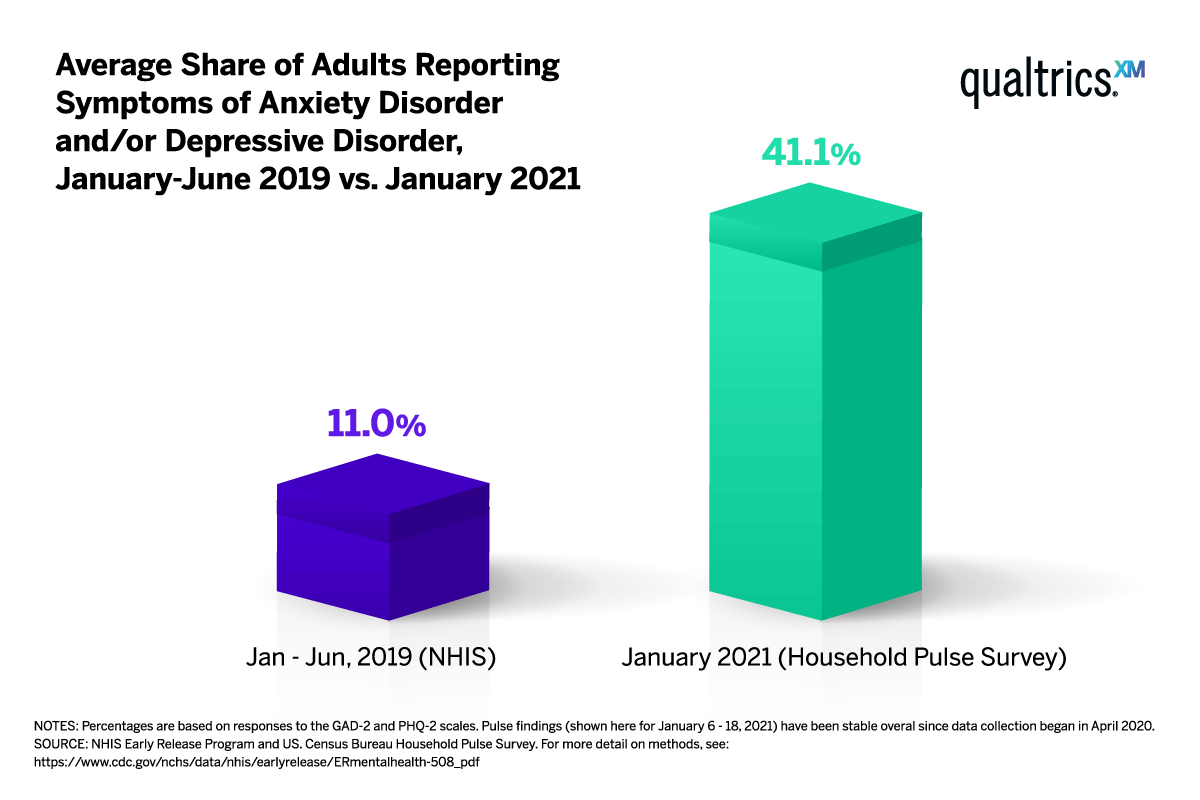
But the picture in 2023 isn’t any better. In fact, it’s worse. New data shows:
- 48% of employees say their wellbeing declined in 2022
- 28% say they are miserable at work
- Stress is at an all-time high
- 60% of employees are emotionally detached at work
- 77% of employees say they would consider leaving a company that doesn’t focus on wellbeing
Free eBook: understand the moments that matter most to your employees
What causes poor mental health in the workplace?
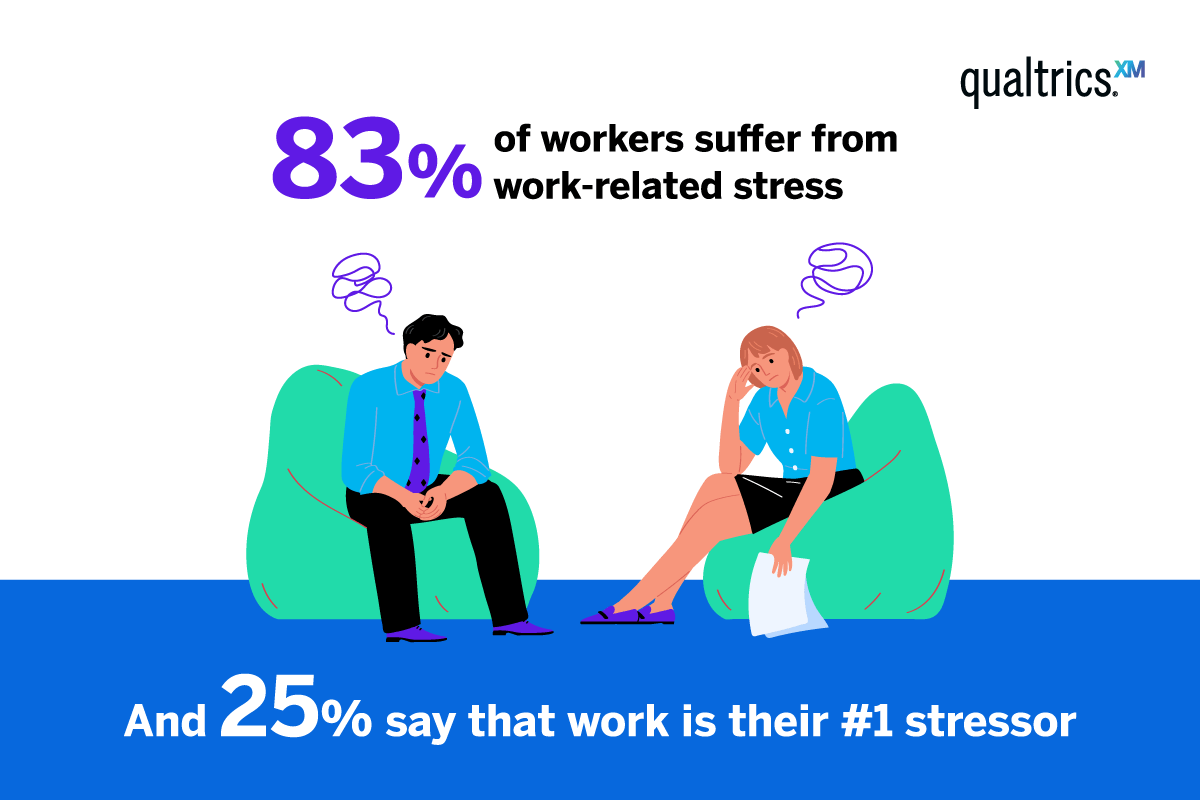
For 83% of Americans, work can contribute a significant amount of work-related stress, with 25% saying that their job is the number one stressor in their lives. Causes of poor workplace mental health include:
External distractions
There’s a lot going on in the world post-pandemic for everyone, employed or not, to be concerned about. It’s impossible to leave concerns about geopolitical events, the climate emergency, soaring inflation, a cost-of-living crisis, the global economy, and fears of recession outside the office door when you come in:
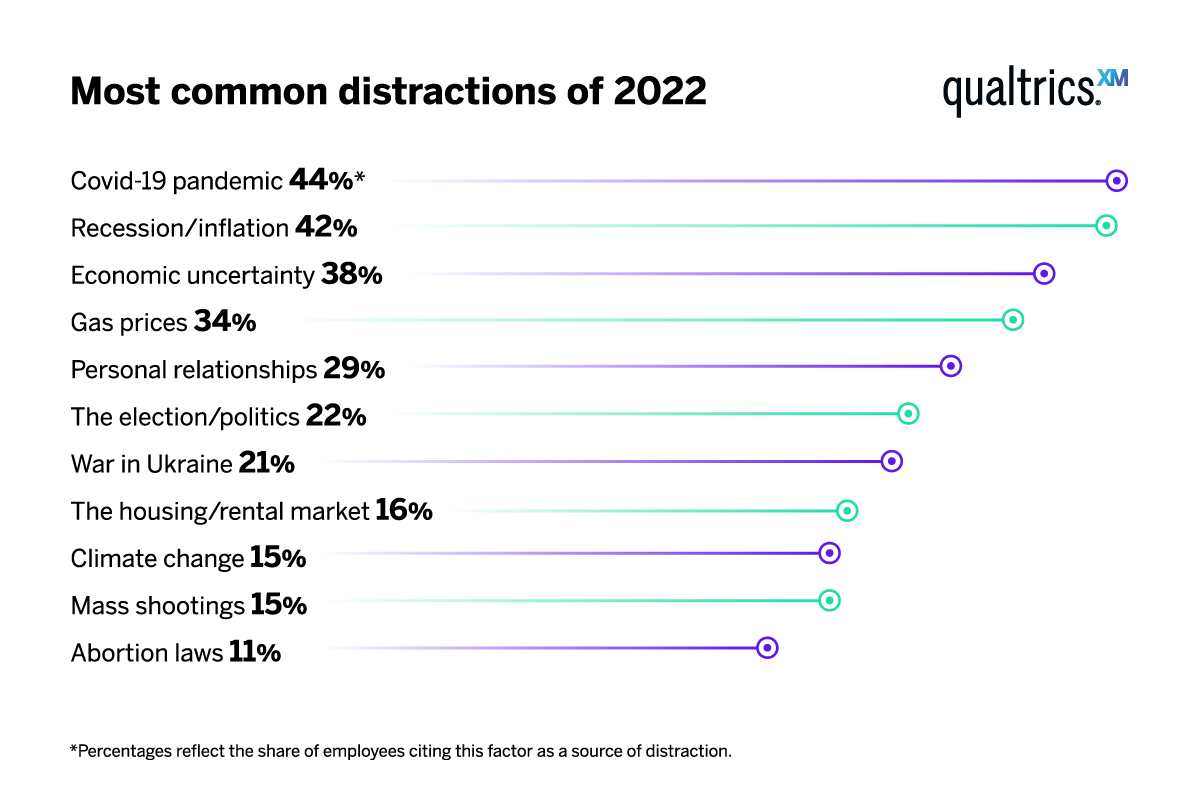
Many people, whether they have a mental health condition or not, find that working offers them a distraction from the world’s problems, and a sense of purpose and wellbeing, which contributes to overall health. This is why it is so important for organizations to create a company culture that nurtures good employee mental health.
Poor communication and feedback
When employees are not sure what they’re doing, and they don’t know if they’re doing a good job or not, that can be stressful, anxiety-inducing and somewhat depressing. It’s essential to listen to employees, communicate clearly and effectively, and give feedback to improve performance.
Micromanagement
Monitoring a new hire for a few months is necessary for them to learn the ropes of a new job. But beyond that, constant managerial ‘checking in’ and vetting established employees just gets in the way of productivity. The best managers leave employees to get on with the job, but with open channels of communication when they need help and support.
Low salary and few development opportunities
Low-salaried jobs with little prospect of advancement make employees feel undervalued and depressed. Our 2023 Employee Experience Trends Report found that only just over half (57%) of employees are satisfied with their current pay and benefits, and that satisfaction has dropped 10 points since last year. More than anything right now employees want to know that the organization they’re working for will continue to be successful in the future and pay a competitive salary.
Toxic workplace culture
Discrimination, harassment, favoritism, blame culture, lack of trust, lack of appreciation, competitive or cutthroat environment, unchecked hurtful office gossip, negative behavior, lack of transparency, a poor manager… most of us will have experienced at least one of these in our working lives. These experiences can be part of what MIT Sloan calls the ‘dark triad’ of toxic culture that contributes to poor employee mental health:
- Failure to promote diversity, equity and inclusion
- Workers feeling disrespected
- Unethical behavior
What is the business impact of ignoring employee mental health?
Absenteeism caused by depression-induced costs US businesses $51 billion a year, and an additional $26 billion in treatment costs, and around one million Americans miss work each day, citing stress. 85% agreed (somewhat to strongly agreed) that workplace stress affects their mental health.
Poor mental health among employees affects these business essentials:
- Employee engagement
- Employee experience
- Productivity
- Absenteeism
- Turnover
- Loyalty
- Job satisfaction
- Health insurance costs
The most common types of mental health conditions in the workplace
There is a whole spectrum of mental health. Good mental health doesn’t mean people must be happy 100% of the time, but does mean they should be able to cope well.
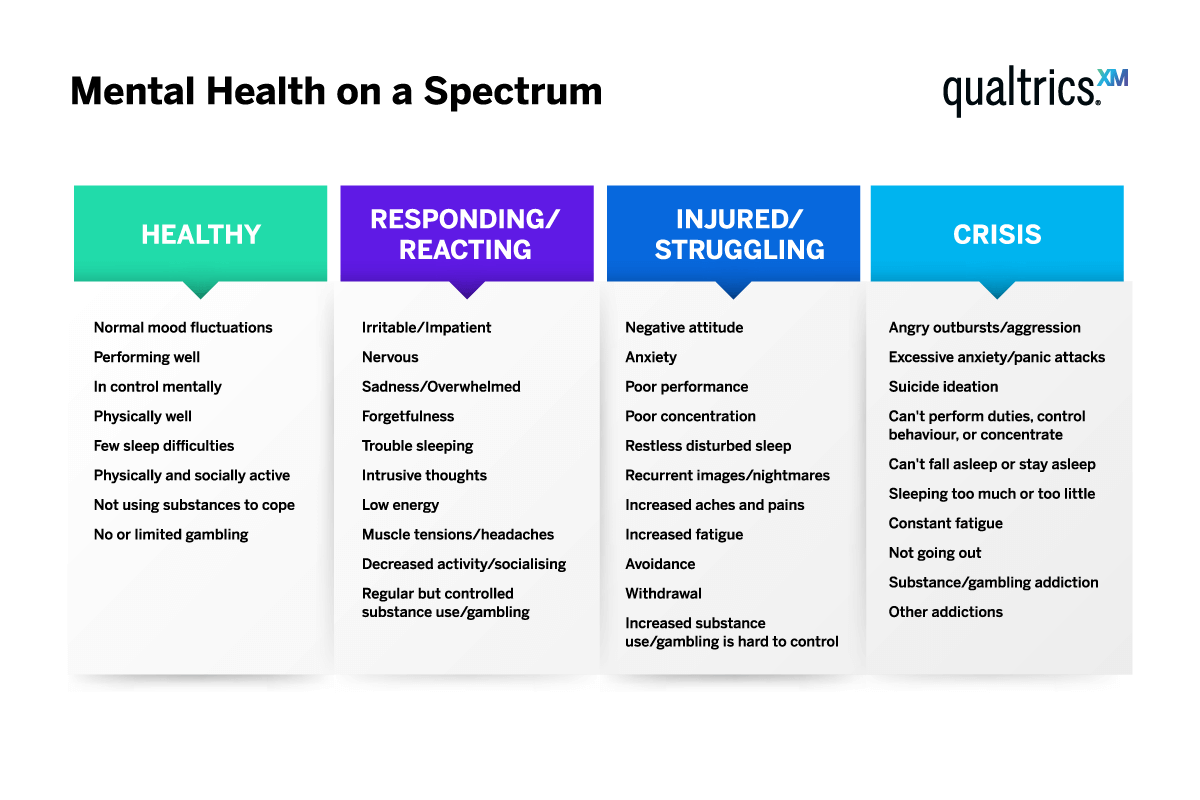
The most common mental health conditions you’re likely to encounter in a work setting are:
- Anxiety: feelings of unease, fear or dread, which may be a result of excessive stress
- Stress: feeling overwhelmed or unable to cope with mental, emotional, or work pressure
- Depression: a low mood disorder that causes persistent feelings of sadness and loss of interest in activities
- Substance abuse: harmful use of alcohol, prescription medications, and other legal or illegal substances
One UK study found that, in 2022:
- 58% of working professionals experience at least mild symptoms of anxiety, and nearly 1 in 4 meet the threshold for clinically relevant symptoms of anxiety.
- 52% of individuals experiencing at least mild symptoms of depression and 22% reporting clinically relevant symptoms of depression.
- 67% of employees surveyed are experiencing moderate to high levels of stress
Image credit: Champion Health
How to spot workplace mental health problems
Business leaders and managers are not doctors. And it takes doctors to diagnose mental health problems. However, there are behaviors and signs you need to look out for that may indicate an employee is struggling with mental health:
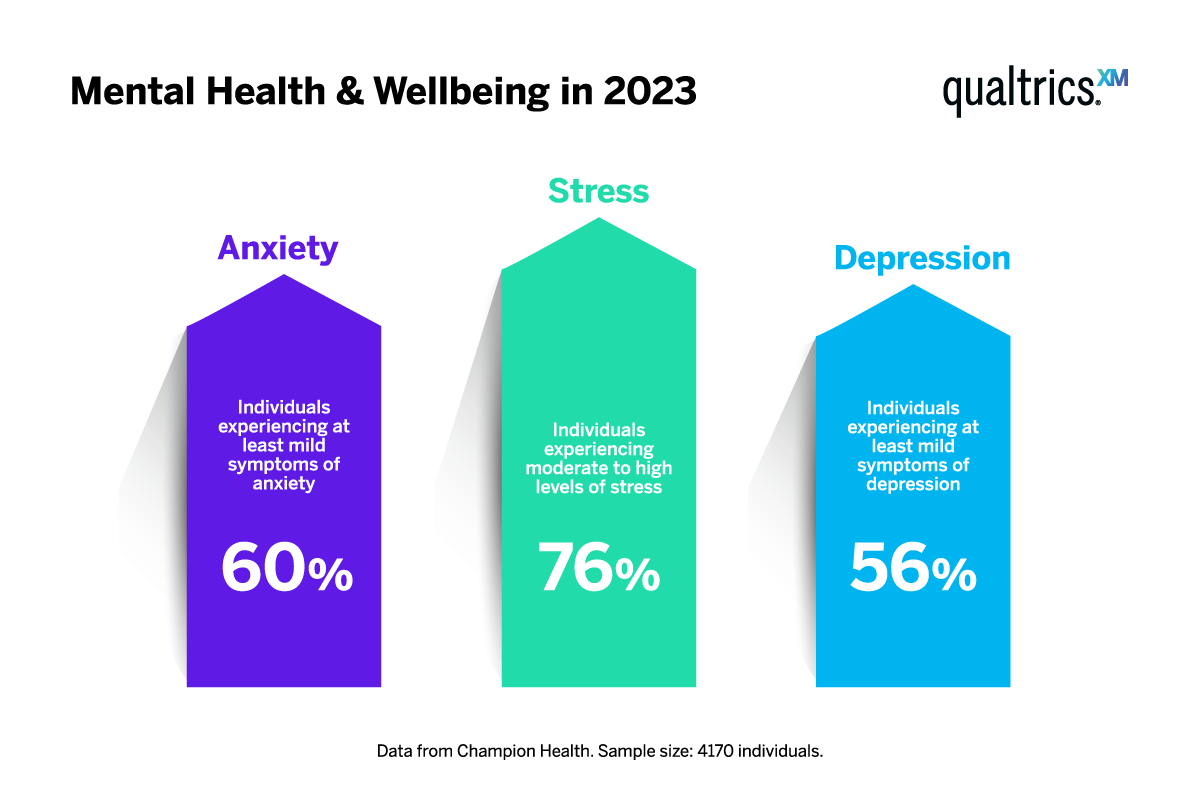
- A change to normal behavior: An employee might not ‘seem themselves’. They may be irritable, snappy, lethargic, tearful, late for or absent from work.
- Less engaged than usual: They may seem distracted, unmotivated, and lack concentration or focus on tasks.
- Decrease in productivity: The employee may struggle to make decisions, take a long time completing tasks, or may not be able to complete them at all.
- Sleep problems: People with mental health issues often have problems with sleeping, such as insomnia; they may look and seem tired, are clumsy and have difficulty staying awake at work.
- Eating problems: Some people with mental health issues lose their appetite, others may ‘comfort eat’; others may develop an eating disorder and miss lunches or refuse to eat with co-workers.
- Lack of interest in activities or work: People with low mood often lose interest in tasks or activities that they may previously have enjoyed.
- Absenteeism: frequent, short absences may be indicative of an inability to cope mentally with work.
- Altered work patterns: As well as frequent absences, behaviors such as being late for work and leaving early, or arriving early and staying later and later, are all red flags that all is not well with an employee.
- Excessive anxieties and paranoia: Incessant, excessive, irrational worrying and paranoia about situations, people and things over which they have no control may indicate a mental health condition.
- Social withdrawal: Avoiding co-workers and absenting themselves from social situations, may indicate a desire for isolation and lack of self confidence that indicates low mood or depression.
- Addictive behavior: Misuse of alcohol and/or drugs, excessive gambling or gaming may also indicate a need to escape that comes from a mental health issue.
How you can improve employees’ mental health
1. Create a workplace culture of belonging
A strong sense of workplace belonging is good for employee mental and physical health. Research shows that workplace belonging leads to a 75% decrease in employee sick days, and it is the top employee experience driver linked to engagement and well-being. People who feel like they belong are almost three times as likely to have a greater sense of well-being: 78% versus 28%.
The lack of a sense of belonging can also cause stress, depression and anxiety. These can initiate a vicious cycle of self-destructive behaviors that further prevent a person from belonging.
2. Listen for signs of mental health issues
Employee listening is the ideal tool for picking up on potential mental health issues and intervening before they affect your people. You can use surveys to ask employees directly about factors that may be affecting their mental health. Or, even better, you can use a listening tool such as Discover XM to collect unstructured feedback through conversation analytics that will uncover every voice – even the quiet ones – so you can pick up on the first hint of a problem.
3. Provide a workplace environment conducive to wellness
A clean, bright, uncluttered, tidy office space, with some greenery, and quieter areas where employees can have a change of scene and relax goes a long way to reducing stress and anxiety. Workplace wellness programs such as gym sessions, team outdoor activities, lunchtime yoga or meditation classes break up the working day with stress-busting changes of pace.
4. Trust your employees to do their jobs
You’ve recruited them, you’ve trained them, you’ve placed them. Now leave your employees to get on with their jobs using their initiative, creativity and abilities. Be there if they ask for help and support though. Employees who have autonomy are more likely to feel valued and find their work meaningful.
5. Promote mental health awareness
Talk openly about mental health, produce, implement and share a company wide mental health plan and develop mental health awareness among employees.
Some mental health in the workplace FAQs
1. What can I do for an employee who is struggling with their mental health?
We would suggest this 5-step approach to support employee mental health:
Reach out to the employee
A simple conversation starter such as “I’ve noticed you’ve not been your usual self recently. Is there anything you’d like to talk through?” gives the employee the opportunity to either reassure you all is well, or to open up about how they are feeling. Ask open questions to help them articulate how they’re feeling.
Listen to what they have to say
Use non-judgmental, reflective listening to reassure the employee that you are truly hearing and taking on board what they are saying. Use open body language to convey empathy.
Manage the situation
You’re (probably) not a doctor, so you’re not responsible for diagnosing the employee, but you are there to give them support and encourage them to find the help that’s right for them. Can the issue be resolved with some workplace interventions? Is this a job for a medical professional?
Support the employee
Let them know that you are there for them, and that you are going to help in any way you can. After the conversation, keep communication open and reassure them that they can talk to you again if they are struggling.
Signpost mental health resources
It’s important to point the employee in the direction of mental health support services – you may have employer sponsored programs such as an employee assistance program that can help with mental health benefits – or to their doctor, who can refer them to specialists if need be.
2. Can an employee be fired for mental health issues?
US employees are protected by the Americans with Disabilities Act (ADA) against discrimination based on a disability, and includes mental health conditions such as anxiety and depression.
According to Mental Health America, you cannot be fired just because you have:
- a physical or mental impairment that substantially limits one or more major life act
- a history of such a disability, or if an employer believes that you have one, even if you don’t; or
- a record of, or being regarded as, having such an impairment.
You must tell your employer that you have a mental health condition, though, for the ADA to protect you, and there are other considerations to be aware of which are summed up neatly here.
3. What obligations does an employer have when an employee has a mental health condition?
Where an employee’s mental health condition qualifies as a disability under the ADA, there are employer obligations and best practices, which include:
- Prohibition of disability discrimination against employees and job applicants in decisions such as hiring and termination
- Prohibition of harassment based on disability
- Employers should engage in an interactive process when an employee’s need for an accommodation is known
- Requirement for employers to provide a reasonable accommodation to qualified individuals with a disability if there is no undue hardship
- Prohibition of retaliation for requesting a reasonable accommodation
Supporting employee mental health with our wellbeing at work solution
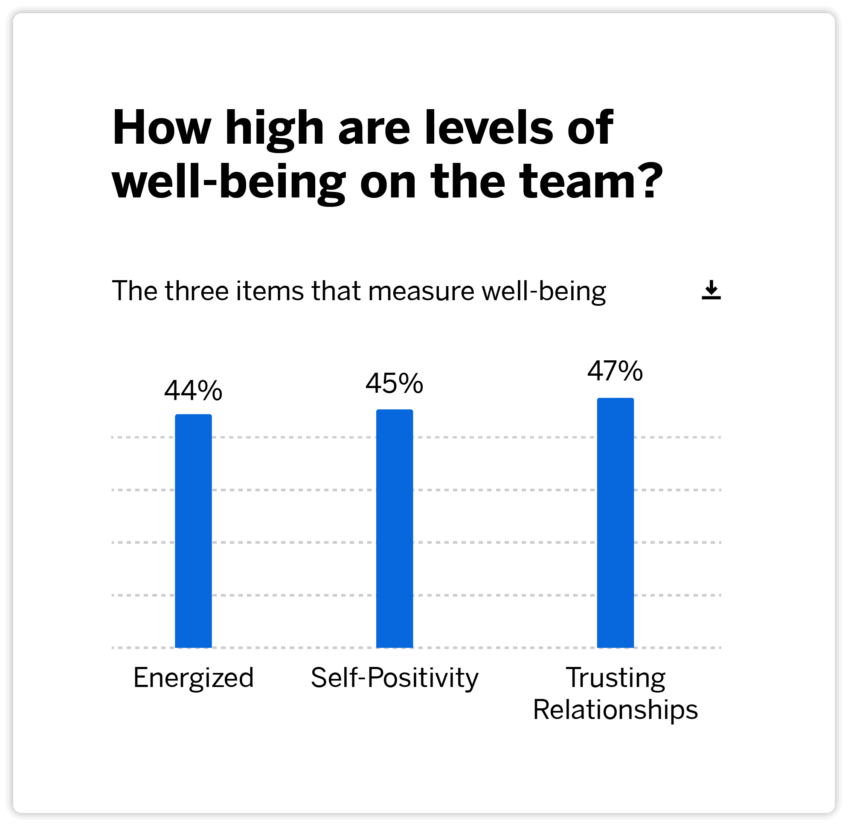
There are two competing things that influence how well employees can navigate the stresses of the workplace and home: demands and resources. When demands exceed resources, the impact can lead to stress and fatigue. These depleted resources result in lower levels of well-being, affecting employees in a number of ways:
- Poorer working relationships between colleagues
- Less trust in managers and senior leaders
- Increased absenteeism and presenteeism (when employees are present but less productive due to poor well-being)
- Work not being completed effectively and to a high standard
- Poor mental health outcomes (i.e. lack of sleep, burnout)
The Qualtrics’ Continuous Employee Listening solution helps you:
- Quickly close well-being gaps at work
- Drive positive change in employee well-being using a scientifically backed methodology
- Understand how and where to take action on well-being at the individual and team level
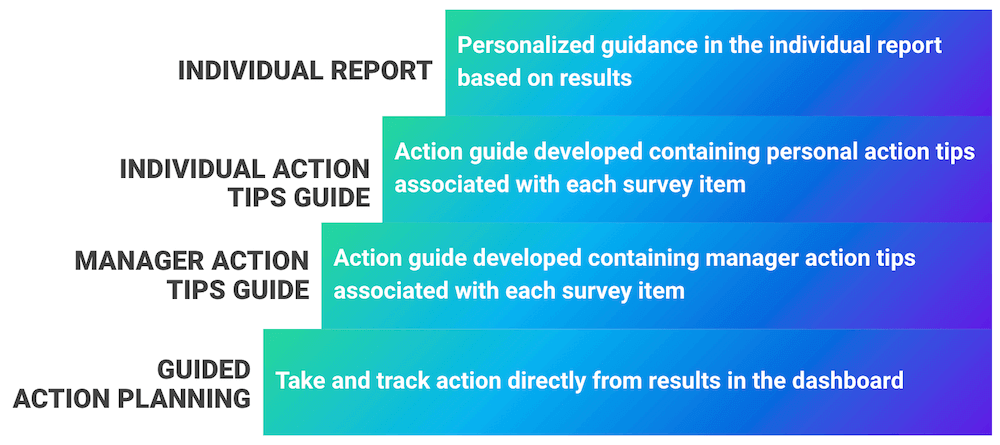
Free eBook: Understand the moments that matter most to your employees